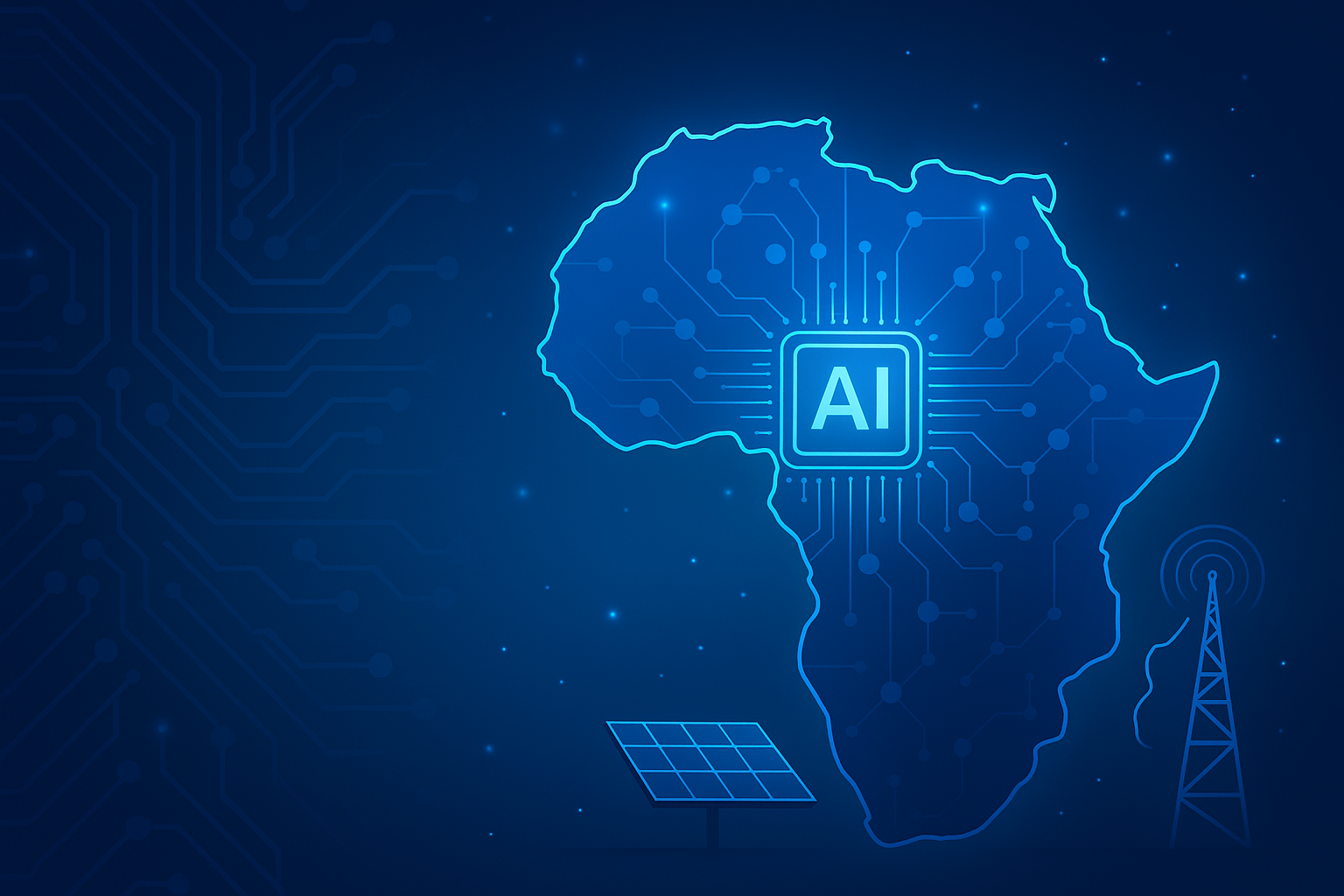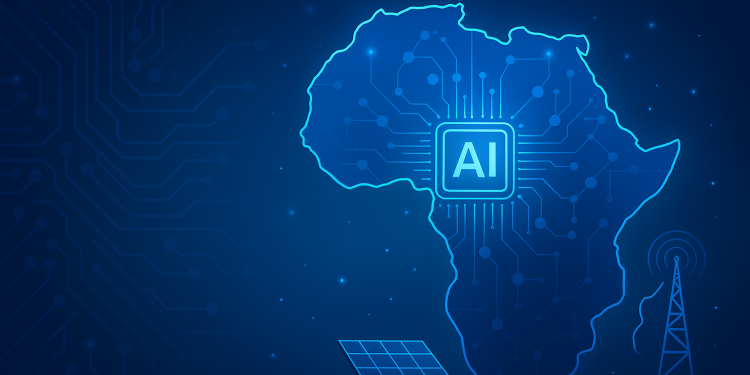
As Africa accelerates its journey into the Fourth Industrial Revolution, the continent stands at a unique crossroads of opportunity and challenge. With rapid population growth, urbanisation, and digital adoption, the need for resilient, intelligent, and sustainable network infrastructure has never been more urgent.
At the heart of this transformation lies Artificial Intelligence (AI), not just as a technological tool, but as a strategic enabler of inclusive development, cybersecurity, and intelligent automation.
While Africa has long struggled with infrastructural gaps, limited access to broadband, and underdeveloped digital systems, a quiet revolution is underway. A growing number of African countries are beginning to harness the potential of AI to optimise network design, manage information flow, and secure critical services in healthcare, education, energy, finance, and public administration. In the sub-region of West, East, and Southern Africa, AI is becoming a linchpin of digital resilience and a cornerstone for achieving the Sustainable Development Goals (SDGs).
The Role of AI in Next-Generation Network Infrastructure
The integration of AI in network infrastructure allows for predictive, self-optimizing, and secure systems that can adapt to the dynamic demands of the continent. Unlike traditional static systems that require manual configuration and troubleshooting, AI-enabled infrastructure can analyze traffic, detect anomalies, optimize routing paths, and forecast demand spikes in real time.
In countries like Ghana, Nigeria, and Kenya, telecommunications operators are already deploying AI-powered network management tools to enhance Quality of Service (QoS), reduce downtime, and prevent service disruptions. These tools rely on machine learning algorithms trained on historical and real-time data to predict system faults, automate troubleshooting, and improve bandwidth allocation across congested areas.
One of the most impactful use cases is predictive maintenance. In regions where physical infrastructure is prone to environmental degradation or sabotage, AI systems can detect early warning signs such as irregular voltage readings or signal loss, before a total failure occurs. This approach significantly cuts costs, minimizes manual inspections, and enhances service continuity across rural and urban regions.
Moreover, AI-driven network segmentation enables better isolation and protection of critical services. Sensitive applications, such as hospital networks or financial systems, can be separated and monitored independently, reducing the risk of cross-network vulnerabilities.
AI for Green and Sustainable Infrastructure
Africa’s energy ecosystem is also benefitting from AI. Across the continent, data centers, base stations, and fiber hubs consume vast amounts of energy, often generated from non-renewable sources. By applying AI to control energy usage, enterprises and governments are reducing carbon footprints and promoting environmental sustainability.
In South Africa and Egypt, for instance, AI is used to optimize cooling systems in data centers by predicting thermal loads and adjusting air conditioning dynamically. In Ghana, pilot programs under the University of Energy and Natural Resources (UENR) have explored AI-powered energy routing to balance grid loads, reduce wastage, and support mini-grid solar integration in rural communities.
Smart grids, equipped with AI algorithms, learn consumption patterns and predict future energy demands, allowing operators to allocate resources more efficiently and respond to outages faster. These intelligent systems are critical in the push toward climate-resilient infrastructure, particularly in areas affected by climate variability and unreliable power distribution.
Pioneering Researchers and Institutions Leading the AI Movement
Africa’s AI transformation is not just being driven by external technologies, but by a growing cadre of African researchers and institutions who are contextualising AI to local realities.
In Nigeria, Dr. Olubayo Adekanmbi, founder of Data Science Nigeria (DSN), has been a vocal advocate for leveraging AI to solve indigenous problems. Through DSN, he has promoted AI literacy and innovation in telecommunications, financial inclusion, and infrastructure monitoring.
In Kenya, Professor Bitange Ndemo, former ICT Permanent Secretary and chair of the Kenya Distributed Ledgers and AI Task Force, has influenced national AI policy and championed smart infrastructure projects for digital governance.
Dr. Vukosi Marivate, Chair of Data Science at the University of Pretoria in South Africa, is one of the continent’s most cited AI researchers. He leads projects focused on natural language processing, real-time analytics, and applied AI in urban infrastructure and public safety systems.
In Ghana, researchers at the Kwame Nkrumah University of Science and Technology (KNUST) and UENR have conducted studies on AI-driven power grid optimization, anomaly detection in industrial systems, and intelligent routing in enterprise networks. These efforts are bridging academia, industry, and national digital transformation agendas.
These individuals and institutions represent a broader movement, one in which Africa is not just consuming AI, but creating indigenous AI frameworks tailored to the continent’s socio-economic and infrastructural contexts.
Cross-Sectoral Impact and Policy Momentum
The African Union’s “Digital Transformation Strategy for Africa (2020–2030)” recognizes AI as a core technology for building inclusive, sustainable economies. Many countries are now embedding AI into national development plans and IT policies. For instance, Rwanda and Ethiopia have launched national AI strategies that integrate infrastructure development with youth innovation and digital inclusion.
Through public-private partnerships, governments are investing in fiber optic rollouts, national data centers, and cloud infrastructure that embeds AI capabilities from the start. Projects in Ethiopia’s Science and Technology City and Nigeria’s National Digital Economy Policy are examples of how AI is being linked to physical infrastructure and long-term planning.
Furthermore, AI is helping bridge the digital divide. In remote areas, AI-based systems are enabling the rollout of low-cost, satellite-based internet solutions. By analyzing terrain, user demand, and atmospheric conditions, these systems can optimize deployment routes and signal distribution—bringing connectivity to where it’s needed most.
Challenges and the Road Ahead
Despite impressive gains, Africa’s AI infrastructure journey is still in its early stages. The continent faces limitations in data availability, skilled personnel, and regulatory frameworks. Without structured policies on data governance, model transparency, and cybersecurity, the risks of AI misuse and inequality remain real.
To overcome this, African governments must invest in capacity building, open data ecosystems, and ethical AI policies. Partnerships with international research bodies, private sector innovators, and local communities will be essential in ensuring AI systems reflect African values and needs.
Africa’s AI-Powered Infrastructure Renaissance
Africa is on the cusp of a digital infrastructure renaissance, driven by AI and anchored in sustainability. From telecommunications to energy, public service to education, the intelligent application of AI is enabling African countries to leapfrog outdated models and develop future-ready systems.
More importantly, the movement is being led by African talent, grounded in African realities. As infrastructure becomes more adaptive, green, and secure, the continent stands to benefit not just from connectivity, but from a platform that supports innovation, resilience, and prosperity.
In the years ahead, the success of Africa’s digital transformation will depend not only on technology adoption but on collaborative design, inclusive policies, and ethical leadership. AI is no longer a future promise it is the foundation of Africa’s present and future networks.
DISCLAIMER: The Views, Comments, Opinions, Contributions and Statements made by Readers and Contributors on this platform do not necessarily represent the views or policy of Multimedia Group Limited.
DISCLAIMER: The Views, Comments, Opinions, Contributions and Statements made by Readers and Contributors on this platform do not necessarily represent the views or policy of Multimedia Group Limited.
- President Commissions 36.5 Million Dollars Hospital In The Tain District
- You Will Not Go Free For Killing An Hard Working MP – Akufo-Addo To MP’s Killer
- I Will Lead You To Victory – Ato Forson Assures NDC Supporters
Visit Our Social Media for More




